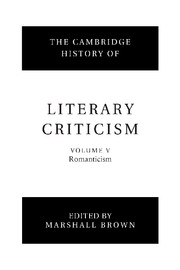Book contents
- Frontmatter
- Introduction
- 1 Classical standards in the period
- 2 Innovation and modernity
- 3 The French Revolution
- 4 Transcendental philosophy and Romantic criticism
- 5 Nature
- 6 Scientific models
- 7 Religion and literature
- 8 Language theory and the art of understanding
- 9 The transformation of rhetoric
- 10 Romantic irony
- 11 Theories of genre
- 12 Theory of the novel
- 13 The impact of Shakespeare
- 14 The vocation of criticism and the crisis of the republic of letters
- 15 Women, gender and literary criticism
- 16 Literary history and historicism
- 17 Literature and the other arts
- Bibliography
- Index
- References
9 - The transformation of rhetoric
Published online by Cambridge University Press: 28 March 2008
- Frontmatter
- Introduction
- 1 Classical standards in the period
- 2 Innovation and modernity
- 3 The French Revolution
- 4 Transcendental philosophy and Romantic criticism
- 5 Nature
- 6 Scientific models
- 7 Religion and literature
- 8 Language theory and the art of understanding
- 9 The transformation of rhetoric
- 10 Romantic irony
- 11 Theories of genre
- 12 Theory of the novel
- 13 The impact of Shakespeare
- 14 The vocation of criticism and the crisis of the republic of letters
- 15 Women, gender and literary criticism
- 16 Literary history and historicism
- 17 Literature and the other arts
- Bibliography
- Index
- References
Summary
The difficulty of our topic emerges into view when we consider Wordsworth's claim in the Preface to Lyrical ballads (1800), certainly one of the key programmatic statements of European Romanticism, that the poet has ‘taken as much pains to avoid… as others ordinarily take to produce’ what he calls ‘poetic diction’ The term refers to exactly that sort of linguistic stylization that traditional rhetorical doctrine, from antiquity to the eighteenth century, had prescribed as the ornamental technique appropriate to poetic speech. Wordsworth's insistence throughout the Preface on the ‘very language of men’ or even the ‘real language of nature’ as the proper stylistic paradigm of poetry amounts, then, to a radical dissociation of poetic writing from the prescriptions of rhetorical doctrine. Coleridge, of course, did not share Wordsworth's adherence to common parlance, but his contention that ‘whatever lines can be translated into other words of the same language, without diminution of their significance, either in sense, or association, or in any worthy feeling, are so far vicious in their diction’ nevertheless implies a cognate renunciation of rhetoric insofar as the principle of the substitutability of expressions is the foundation of traditional rhetorical elocutio. Nor are these disparagements of rhetorical doctrine unique to their authors; they exemplify a widespread attitude formulated as early as the 1770s and characteristic of Romanticism generally. In this sense, one can agree with the historical diagnosis of Ernst Robert Curtius that Romanticism represents a decisive rupture in the European literary tradition precisely to the extent that it evacuates rhetorical doctrine, which had linked that tradition to its roots in antiquity, of theoretical and pedagogical significance.
- Type
- Chapter
- Information
- The Cambridge History of Literary Criticism , pp. 185 - 202Publisher: Cambridge University PressPrint publication year: 2000
References
- 8
- Cited by

